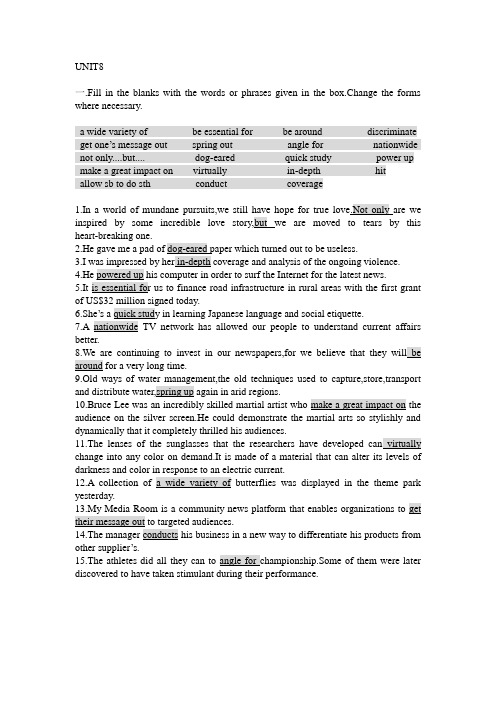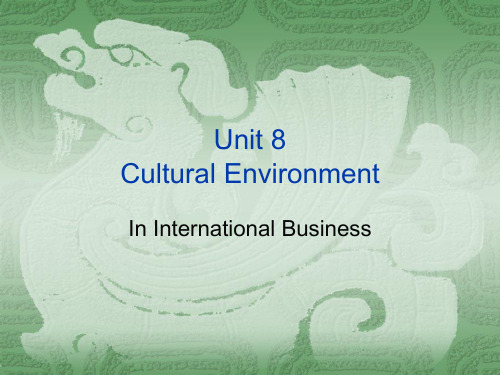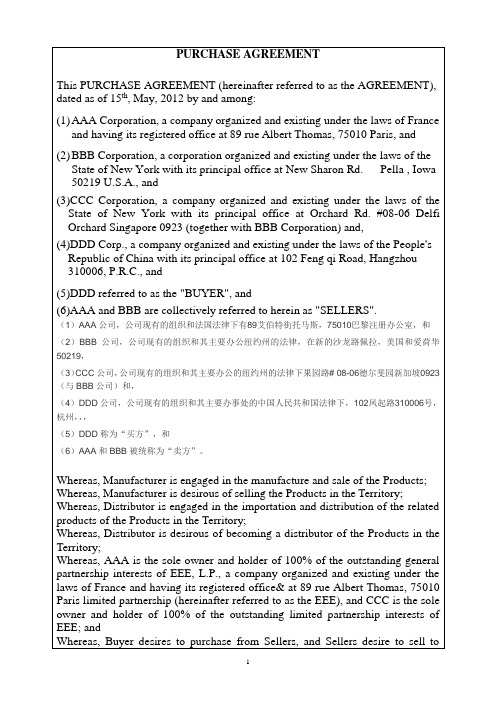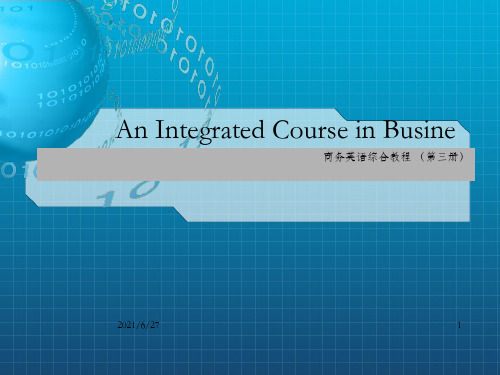商务英语翻译Unit 8 国际商法共32页
商务英语unit8

一.Fill in the blanks with the words or phrases given in the box.Change the forms where necessary.a wide variety of be essential for be around discriminate get one’s message out spring out angle for nationwide not only....but.... dog-eared quick study power up make a great impact on virtually in-depth hitallow sb to do sth conduct coverage1.In a world of mundane pursuits,we still have hope for true love.Not only are we inspired by some incredible love story,but we are moved to tears by this heart-breaking one.2.He gave me a pad of dog-eared paper which turned out to be useless.3.I was impressed by her in-depth coverage and analysis of the ongoing violence.4.He powered up his computer in order to surf the Internet for the latest news.5.It is essential for us to finance road infrastructure in rural areas with the first grant of US$32 million signed today.6.She’s a quick study in learning Japanese language and social etiquette.7.A nationwide TV network has allowed our people to understand current affairs better.8.We are continuing to invest in our newspapers,for we believe that they will be around for a very long time.9.Old ways of water management,the old techniques used to capture,store,transport and distribute water,spring up again in arid regions.10.Bruce Lee was an incredibly skilled martial artist who make a great impact on the audience on the silver screen.He could demonstrate the martial arts so stylishly and dynamically that it completely thrilled his audiences.11.The lenses of the sunglasses that the researchers have developed can virtually change into any color on demand.It is made of a material that can alter its levels of darkness and color in response to an electric current.12.A collection of a wide variety of butterflies was displayed in the theme park yesterday.13.My Media Room is a community news platform that enables organizations to get their message out to targeted audiences.14.The manager conducts his business in a new way to differentiate his products from other supplier’s.15.The athletes did all they can to angle for championship.Some of them were later discovered to have taken stimulant during their performance.Complete the following passage by choosing the right word from the four choices.In the 20th century,newspapers have faced competitive challenges form many different 1___.But they have survived.In the early part of the century,a new 2___ gadget,radio,mounted the first major challenge.For the first time,citizens could 3___in their homes and hear the voices of newsmakers from around the world coming directly into their living rooms.While newspaper realized the 4___of this new electronic gadget in the early 1930s and tired to do something about it,radio news didn’t come of age until World War II in the 1940s.For the first time,radio demonstrated effectively that it could keep the public 5___about news events anywhere in the world.The next challenge for newspapers came midway through this century 6___television became a dominant force.Although many of the early newscasts were still primitive---using still pictures 7___by news anchors or film footage that was days or even weeks old---the 1960s 8___two events that brought about a major change in the audience’s perception of television news.The first was the 9___by the three television networks to a 30-minute newscast in 1963.It was in 1963 10___ television news came of age in the eyes of 11____ with its extensive coverage of the assassination and funeral of President John Kennedy.12____ radio could provide immediacy to news,television provides the visual image---actual pictures of the news event,sometimes it’s actually taking place.Through these challenge,newspapers continued to exist,13____the written history of events as well as more details14____most radio or television newscasts could 15____ hope to include.But along the way,newspapers have had too made some adjustments to remain competitive.1.A.origins B.resources C.routes D.sources2.A.electronic B. electric C.electrical D.electricity3.A claim B.maintain C.remain D.sustain4.A treat B. Threat C.retreat D.thread5.A deformed B.formed rmed D.affirmed6.A when B.although C.thus D.whereas7.A hold B.held C.to hold D.holding8.A sees B.see C.saw D.seeing9.A exposure B.extension C.exclusion D.expansion10.A as B.when C.why D.that11.A viewers B.listeners C.witnesses D.spectators12.A.While B.When C.As D.Although13.A provided B.provide C.to provide D.providing14.A as B.than C.whenever D.forever15.A never B.ever C.whenever D.forever【答案】1-5 DACBC 6-10ABCDD 11-15 AADBB三.TranslationPut the following sentences into English,using the proper phrases given in the box.no longer be essential for present...for power...upput up make impact on set up turn tospring up a wealth of get...out click...onto1.只要在电脑屏幕上点击新闻,就会有大量最新新闻出现在你眼前。
职场综合英语教程第三册Unit 8 E-commerce

Related Information eBay Inc.
With 128 million active users globally, eBay is one of the world's largest online marketplaces, where practically anyone can buy and sell practically anything.
Related Information
Watch Video 2
"Double-11" Festival in China
Related Information
China's online retailers are gearing up for what has become the country’s annual online shopping festival on November 11th. November 11 is a date made up of four one's, and “double eleven” has always been considered a special day for single men and women in China. Five years ago the internet retailer Alibaba began promoting it as a shopping festival, and it has now turned to be the country's busiest day for online retailers, millions of shopping lovers and thousands of couriers.
商务英语翻译 Unit 8

• (3)商业套语的应用 • 英、汉两种语言都有很多商务信函方面的套语,翻译时套 用即可。例如: • 英语 汉语 • 招呼语套译 Dear Sirs,/Madam 尊敬的阁下/女士 • 敬辞、谦辞 appreciate/pleasure 惠请/敬复 • 结尾敬语 yours faithfully 顺致敬上
• Dear Sirs, • • We are interested in the various types of LED Panel Lights you displayed at the Guangzhou Trade Fair in April. We are importer of LED Light in Australia and have been in this line for over ten years. We expect to establish mutually beneficial business relations with you with keen interest. • We will appreciate it very much if you will quote us your latest price FOB Shenzhen for 5000PCS LED Panel Lights, Model No. ISL. PLSE.6WBL and send us some samples. If your goods and trade terms prove satisfactory, we will place large order with you. • • We are looking forward to your early reply. • Yours faithfully,
商务英语II(UNIT8)

Business English Certificate
40Write a 40-50 word memo
To: From: Re:
All staff Roger Hargreaves Expenses
May I remind all staff that you need to include recபைடு நூலகம்ipts with all expenses claims. Claims will not be accepted without receipts. Expenses are now all paid by cheque rather than in cash and it will take approximately two weeks to process each claim. Thank you.
Vocabulary
Expenses amount to authorise business trip to claim/ claim back (expenses) claimant to come to ($125) to fill in (a form) to incur (expenses) line manager to make a (false) claim on business to process (a claim) random check receipt to reimburse small print
Business English Certificate
Insurance
2.1 General Liability Insurance责任保险(指保险公 司负责被保险人依法对他人承担赔偿责任的保险(excluding auto) 2.2 Business Insurance for Private Automobiles 2.3 Rented Automobile 2.4 Travel and Extended Health
国际商务英语Unit 8

-
Messages have to be explicit, A person's word is not to be relied on, Paperwork is important
of a group and their characteristic products
Cultural Influence on Marketing
How does culture influence color customer behavior?
Taste style
preference
Approaches to Study of Culture
Information Gaps: Listen to Your Customer(s)
Self-Reference: Home Builders construct what they think
customers will need (Presumptuous)
RESULT: Cookie Cutter (千篇一律)designs, mass
SURVEY FINDINGS Many Customers prefer doing without . . . Fireplaces Covered Porches Coffee Bar Loffice (A combination loft + office space for a computer)
Unit 8 CulБайду номын сангаасural Environment
商务英语翻译(英译汉)第二版电子教案第8单元

• 人们关注的焦点在于网上银行服务是否能够校验新存款人的身份、保 证客户能够安全地交易。
例句四
• This consideration decided our invitation to the mayor for the first China National Stone Products Fair (P77).
• economy: the system by which a country’s money and goods are produced and used, or a country considered in this way
“公司”的分类
• firm • practice • manufacturer • business
• 该公司运行稳健,其秘密就在于其整体生产体系,即从初期的开发和 设计一直到采购和生产等,都非常卓越。
• 该公司运营稳健,秘诀在于整个生产系统从初始阶段的开发设计一直 到采购生产,每个环节都非常出色。
例句八
• A sense of restlessness and hopelessness still prevails among nonmanufacturers, small and midsize firms and regional economies (P79).
• 该公司的工会及其业务伙伴提出了反对意见,这成为签订协议的障碍。 • 该公司的工会和商业合作伙伴提出了反对意见,这成为签订协议的障
碍。
例句六
• The dollar’s accelerated depreciation could hurt not only the Japanese economy, but the global economy as a whole (P77).
国际商法中英版.doc

Buyer.This Agreement is written in the English language. In case of any discrepancy between the English version and any translation thereof, the English text shall govern.然而,制造商从事产品的制造和销售;然而,制造商渴望在境内销售的产品;然而,经销商从事境内产品的相关产品的进口和分销;然而,分销商渴望成为境内经销商;然而,AAA的产品,公司优秀的普通合伙利益的唯一拥有者和100%人,公司现有的组织和法国法律下有89艾伯特街托马斯登记办公室,75010巴黎有限责任合伙公司(以下简称EEE),和CCC的EEE 优秀的有限责任合伙公司的利益100%的唯一所有权持有人;及然而,买方从卖方购买欲望,欲望和卖方卖给买方。
本协议以英文写成的。
在英文版及其任何翻译如有差异,以英文文本为准。
Now Therefore, the parties hereto agree as follows: (*"Manufacturer", "Products", "Territory", "Interests","Purchase" and "Distributor" are all to be defined in other parts of the contract.)因此,双方同意如下:(*“制造商”,“产品”,“领土”,“利益”,“购买”和“经销商”都被定义在本合同其他部分。
)1. CERTAIN DEFINITIONS; PURCHASE AND SALE OF INTERESTS.(a) CERTAIN DEFINITIONS. As used in this Agreement (including theSchedules and Exhibits hereto), the following definitions shall apply:某些定义。
商务英语翻译 Unit 8

Task Presentation
• This morning the manager received an email from Anna, Australia S&D Trading Co., Ltd. Because the manager himself knows little English, so he asked you to translate the letter into Chinese.
Discussion
• 1. How many parts are there in a business letter? • 2. What are the language features in business letters? • 3. What methods and techniques do you think can be used when translating business letters?
• Dear Sirs, • • We are interested in the various types of LED Panel Lights you displayed at the Guangzhou Trade Fair in April. We are importer of LED Light in Australia and have been in this line for over ten years. We expect to establish mutually beneficial business relations with you with keen interest. • We will appreciate it very much if you will quote us your latest price FOB Shenzhen for 5000PCS LED Panel Lights, Model No. ISL. PLSE.6WBL and send us some samples. If your goods and trade terms prove satisfactory, we will place large order with you. • • We are looking forward to your early reply. • Yours faithfully,
初级商务英语Unit8

Unit 8Information handingChecking and confirming1.ListeningWhen telephoning, it is very important to get certain facts right, for example, the name, address, and telephone number. Listen to the following telephone call twice. The first time, listen to it from the point of view of the caller and complete his notes below. The second time, listen to it from the point of view of the person who answered and complete his notes.First listening: Caller’s notesSecond listening: Called person’s notesListening TaskA: Priority Investments. Can I help you?B: Yes, this is George Biederbeke. Could I speak to someone in your corporate finance department?A: Just a moment, I’ll put you through.C: Daniels speaking.B: My name is George Biederbeke fr om the Austin Corporation. I’d like to make an appointment to see your corporate Finance Manager.C: Yes. Could you tell me what exactly you want to talk about?B: Well, we’re approaching a number of investment companies with a view to placing business with them.C: I’m sorry, I didn’t quite catch that.B: I said that we are interested in your investment services.C: I see, and you would like to meet our Corporate Finance Manager?B: That’s right.C: When would be convenient for you?B: Friday 28 June would suit me-in the afternoon.C: Just a moment, I’ll check with Mr. Foster-our Corporate Finance Manager.B: I’m sorry, I didn’t catch his name.C: Foster.B: Right.C: Just a moment, let me check…Yes, that’ll be fine, about 2 p.m. Could I have y our name again?B: Biederbeke.C: Could you spell that please?B: B, I, E, D, E, R, B, E, K, E.C: Right. I’ve got that. We’d like to send you a copy of our current prospectus. If you give me your address…B: Of course. It’s the Austin Corporation, 514 Seaview…C: 514 Seanew.B: No, tit’s Sea-view.C: Right, I’ve got that.B: 2952 Seattle.C: 2952 Seattle. Right, let me just repeat that. Mr. Bideerbeke, Austin Corporation, 514 Seaview, 2952 Seattle.B: Right.C: And your telephone number, Mr. Biederbeke?B: It’s (0452) 67791C: (0452) 67791. Right. We’ll get the prospectus in the post to you today.B: Good. Let me just confirm the appointment. Friday 28 June at 2 o’clock.C: Fine, we look forward to seeing you then.B: Goodbye.C: Goodbye.2. PresentationIn the telephone conversation the speakers followed a number of steps when handling and exchanging information, in particular.# clarifying information# asking for repetition# asking for spelling# showing understanding# correcting information# confirming information# acknowledgingNow look at the language used to handle information.2.1 Clarifying informationCould you tell me exactly what…?2.2 asking for repetitionCould I have your name again, please?Could you repeat that?I’m sorry, I didn’t catch that.2.3 asking for spellingCould you spell that, please?2.4 showing understandingI see.I’ve got that.Right.2.5 correcting informationNo, not seanew. Seaviesw.That’ not right, it’s…..2.6 confirming informationLet me just repeat that,…2.7 acknowledgingThat’s right.Notes:1. Saying and repeating telephone numbers:Look at the number: 081-455 2354.The number consists of three groups.0 is pronounced ‘oh’ or zero;455 is verbalized as four double five or four five five;the numbers should be grouped, e.g. 081 pause 455 pause 2354.2. Spelling names:A useful way to remember the pronunciation of some letters is to group them by vowel sound:请详见附图3. Controlled practiceA. Complete these dialogues.1.A: My name’s Pinkerton.B: __________________?A: Yes, it’s P, I, N, K, E, R, T, O, N.2.A: The address is 24 Tunnyside Lane.B:_____________________________?A: Yes, of course. 24 Tunnyside Lane.3. A: My phone number is 0432 5686B: 0432 5688?A: ____________ 5686.B: ____________ 0432 5686.A: _____________________.4. A: I’d like an appointment with Mr. Dunn.B: _______________________________ you would like to discuss?A: Yes, I’d like to talk about extending my credi t.5.A: We would like to visit your factory with a view to buying it.B: ________________________. When would you like to come?6.A: The figure is 3.56m.B: ____________. And what was the other figure?7.A: So, an appointment at two would suit you. ____________ again please?B: Yes, certainly. It’s Macintosh.A: ________________________?B: Yes, M, A, C, I, N, T, O, S, H.B. Listen to the tape. You will hear some telephone numbers. As you listen, write the number down. After each number, there will be a pause for you to repeat the number. 1. _______________ 2. ____________________ 3. __________________.4. _______________5. ____________________6. __________________.C. Listen to the tape. You will hear some names and then a request to spell them. There is a pause on the tape for you to spell them and then you will hear the correct spelling. The names are:1. Peterson2. Hardy3. Glynis4. Matthews5. Rifkind6. Thatcher7. Samuel8. MarjorieNow listen to the tape again. This time, cover up the names above and write them down when you hear them spelt.1. _______________2. ____________________3. __________________.4. _______________5. ____________________6. __________________.7. _______________ 8. ____________________课文注释及词汇讲解* priority 重点,优先eg. priority projects重点项目* make an appointment 安排一次约会eg. I’d like to make an appointment to see your Corporate Finance Manager.我想约见一下你们公司的财务经理。
商务英语 Unit 8 corporate hospitality

Just identifying interesting events or places to visit does not alone ensure successful corporate hospitality. As a companion, your interaction with the clients also counts for much. Unless you are a naturally outgoing and talkative person, making interesting conversation with a relative stranger for an extended period of time can be difficult. Here are some tips to consider:
Unit 8 Corporate Hospitality
Tips:
corporate hospitality: It is a fabulous way to win favor with clients. It helps to build strong relationships with new and potential clients as well as nurtures and cultivates a long and healthy relationship with existing clients. It’s the Law of Reciprocity: You give someone something and they feel need to reciprocate. The best way to do this is to use some sort of participatory event where enjoyment is the key. Seeds of business dealings and contracts are sown in the relaxed and enjoyable surroundings. A corporate hospitality event is the perfect occasion to launch a new product. However, it is not all about winning new businesses. Perhaps you’ll want to take it as an opportunity to give thanks to longtime customers for their loyalty and support.
商务英语综合教程第三册Unit 8 International Business_OK

Company Logo
7
Unit 8 International Business (7)
2.Ghosh says boards of successful companies often seek out the founders and CEOs of failed compa nies because they value experience over a clean slate. After all, Henry Ford and Steve Jobs experie nced multiple failures before achieving success.
(3) Your love will not be willing to listen to your criticism.
• 爱情方面,你的伴侣不会乐意听你的批评。
Company Logo
6
Unit 8 International Business (6)
• 我们所有人都知道工作的重要性,不仅仅是为了一份薪水, 也为了心灵的平静,这份平静是随着你能供养自己的家庭 而来。
Company Logo
11
Unit 8 International Business (11)
the more... the more 越……更 (1)The more you learn, the more you know, The more you know, th
2021/6/27
2
Unit 8 International Business (2)
Warm-up Activities
I. Pair work Do you want to start your own business?
商务英语翻译(英译汉)第二版电子教案第8单元

例句九
• Speculation that some major banks may find themselves with capital shortfalls and then nationalized is driving investors to dump the banks’ shares (P78).
• 美元在加速贬值,它所损害的不仅仅是日本经济,还有整 个世界的经济。
• 美元加速贬值,不仅损害了日本经济,也伤及了全球整体 的经济形势。
例句七
• The secret to the company’s robust performance is the excellence in its total production system, from the initial development and design through to procurement and production (P77).
• consolidate: to join together a group of companies to become one
例句三
• Concerns have been raised over the ability of Internet banking services to verify the identity of new depositors or to guarantee the security of customer transactions (P76).
主语的翻译
例句一
• Extremely keen competition between American and Japanese vehicle manufacturers in the American market has compelled us to bring down the price for the time being (P75).
商务英语翻译Unit 8 国际商法

• 7. Legal sentences have an underlying logical structure: "if X, then Z shall be (do) Y" - "if X" = conditional/ concessive adverbial clauses: • eg: co-ordinated adverbials: on the expiration …… or on the previous death ……/ subject to any authorized endorsement …… and to the production…… • 8. Written legal English contains nominal group structures (eg: post-modification in the nominal groups): eg. any insstalment then remaining unpaid, hereinbefore reserved and agreed to be paid during the term. • 9. Adjectives and intensifying adverbs are almost completely absent: • eg: splendid, wise, disgusting, happy (adjectives) ; very, rather (intensifying adverbs) • 10. Nouns modified by structures of post-modification are "abstract": eg. declaration, conditions, termination, stipulation, possession.
商务英语Unit 8(2014)

Questions to check the understanding: 1. In which stage we can apply the technique of target costing? And what is the function of target costing? 2. How to define the target cost? 3. In which areas does Olympic Optical apply value engineering in order to reduce cost ? 4. What is the function of product-specific kaizen costing? How to reduce the cost ?
product costing
Target costing目标成本法 Feed-forward mechanism 前馈机制 Product functionality 产品功能 Profit margin FOB price / CIF price Value engineering价值工程/工程经济 学 7. Labor-intensive 劳动密集 1. 2. 3. 4. 5. 6.
Questions to check the understanding: 1.What are the three benefits to integrated cost management? 2.How can target costing reinforce product-specific kaizen costing? 3.How can target costing reinforce general kaizen costing?
unit 8商务合同翻译

4商务合同常见法律词汇翻译
法律合同用副词的翻译 商务合同属于法律性公文,通常使用一套惯用的古体 英文副词,起到结构严谨、逻辑严密、言简意赅的作用。 例如: hereafter, 从此以后; thereafter, 从那以后; thereon /thereupon,在其上 thereunder 在其下; hereto 对于这个; hereinabove, 在上文; hereinafter 在下文 thereinbefore, 在上文中; thereinafter 在下文中。
5商务合同的双介词翻译
双介词/双连词的翻译
(2)英译起止时间时,常用双介词来限定准确的时间 例:自9月20日起,甲方已无权接受任何定单或收据。 译文: Party A shall be unauthorized to accept any orders or to collect any account on and after September 20. 例:我公司的条件是,3个月内,即不得晚于5月1日,支付现金。 译文:Our terms are cash within three months, i.e. on or before May 1.
3.商务合同用词翻译
3.1 合同用词的翻译
合同英语的用词极其考究,翻译通常需要注意以下几个方面: (1)情态动词may, shall, may not, must 的翻译 may 旨在约定当事人的权利(可以做什么),shall 约定当事人的义 务(应当做什么),must 用于强制性义务(必须做什么),may not 用于禁止合同句式的翻译 例(3)支付:不可撤销即期信用证转船前30天开到卖方。 译文:Payment: By the irrevocable L/ C at sight reach the sellers 30 days before the time of shipment. 例(4):如果买方向卖方提出索赔(包括换货),并出具 了相应的检验证明,卖方将支付全部费用。 译 文 : The Buyer shall make a claim against Seller (including the replacement ) by the further inspection certificate )and all the expenses incurred there from are borne by the seller.
商务英语翻译 第8章 商务法律合同协议的翻译

如此运输单据有数份正本,则应向买方提供全套正本。
如买卖双方约定使用电子方式通讯,则前项所述单据可以由
具有同等作用的电子数据交换(EDI)讯息代替。
第一节 翻译例析
Sample 2
TRADE CONTRACT BETWEEN THE GOVERNMENT OF THE PEOPLE’S REPUBLIC OF
1. That during the course of my employment there may be disclosed to me certain trade secrets of the company; the said trade secrets consisting but not necessarily limited to:
Article 2 The Republic of…… shall, according to its requirements, import from China commodities enumerated in list “B” for a total amount of $ … (U.S. dollars)
This document (for example a negotiable bill of lading, a non-negotiable sea waybill or an inland waterway document) must cover the contracted goods, be dated within the period agreed for shipment, enable the buyer to claim the goods from the carrier at the port of destination and, unless otherwise agreed, enable the buyer to sell the goods in transit by the transfer of the document to a subsequent buyer (the negotiable bill of lading) or by notification to the carrier.
商务英语综合教程(上册)Unit 8 The Costs of Economic Growth-精选文档

Unit 8
The Costs of Economic Growth
Text
4 Mill actually looked forward to the coming of a “stationary state,” providing, of course, that the population problem (which had worried his predecessors, Malthus and Ricardo) could be handled and a decent standard of life could be guaranteed to the working classes.
7
Unit 8
The Costs of Economic Growth
Text
8 The second theme of this argument, and increasingly the more important theme, has to do with the costs of economic growth. Growth has always had associated costs. At the time of the English Industrial Revolution, there was the tremendous dislocation in the traditional pattern of life that the birth of the industrial system involved. Indeed, even the measurement of growth is made difficult by the fact that many of the products that we include in our GNP may actually be nothing but costs of an industrial-urban society. Suppose we lay tracks and
- 1、下载文档前请自行甄别文档内容的完整性,平台不提供额外的编辑、内容补充、找答案等附加服务。
- 2、"仅部分预览"的文档,不可在线预览部分如存在完整性等问题,可反馈申请退款(可完整预览的文档不适用该条件!)。
- 3、如文档侵犯您的权益,请联系客服反馈,我们会尽快为您处理(人工客服工作时间:9:00-18:30)。
business law. 3. Master the difficult words, expressions and
business terminologies. 4. Master the skills of translation upon international
• 3. The use of graphological devices as a means of revealing structure, content and logical progression: eg. an important word capitalized or underlined.
• 8. Written legal English contains nominal group structures (eg: post-modification in the nominal groups): eg. any insstalment then remaining unpaid, hereinbefore reserved and agreed to be paid during the term.
business law.
Section I
Section I 译例研究
译例研究
Introduction
• 国际商法(International Business Law)是调整国际商 事关系的法律规范的总称。它的调整对象是国际商事关系, 即:各国商事组织在跨国经营中所形成的商事关系。
• 目前,国际商法在法律渊源方面已形成了国际条约、国际 贸易惯例(两者我们可合称为国际法渊源)、国内法并存 的局面。具体讲,凡调整跨国界商事关系的法律规范,不 论它以国际公法规范、国际经济法规范表现出来,还是以 当事人自愿接受的国际商事惯例、国内商法中的国际性规 范形式表现出来,在本质上都属于国际商法的范畴,彼此 之间互相依赖、互相补充、互相转化、互相作用。各国之 间涉外商法的差异日渐缩小,国际商法的内容也不断丰富 和完善,国际商法统一化进程日益加快,为适应并促进国 际经济一体化发挥了积极作用。
• - substitute words not tolerated: eg. he, she, it, they(pronoun reference); do; this, that(anaphora)
• 6. Legal English contains only complete major sentences: eg. statements, no question, occasional commands.
Characteristics of English Legal
Language
• 1. Extreme linguistic conversion of legal English: copied directly from "form books"(法典)
• 2. Unbroken format in early legal documents: no spaces provided (to avoid fadulent deletions and additions)
CONTENTS
Teaching Aims
Section I 译例研究 Section II 技能拓展 Section III 巩固练习
Teaching Aims
After studying this unit, you are required to: 1. Have a general idea about international business
• 10. Nouns modified by structures of post-modification are "abstract": eg. declaration, conditions, termination, stipulation, possession.
• 11. Verbal groups are of the type: modal auxiliary (shall) + be + past participle : shall is used to express what is to be the obligatory consequence of a legal decision, and not simply as a marker of future tense.
• 9. Adjectives and intensifying adverbs are almost completely absent:
• eg: splendid, wise, disgusting, happy (adjectives) ; very, rather (intensifying adverbs)
• 7. Legal sentences have an underlying logical structure: "if X, then Z shall be (do) Y" - "if X" = conditional/ concessive adverbial clauses:
• eg: co-ordinated adverbials: on the expiration …… or on the previous death ……/ subject to any authorized endorsement …… and to the production……
• 4. The dearth of punctuation to prevent forgery.
• 5. Legal documents composed as one very long sentence - no question of sentence linkage, except:
• - the repetition of lexical items.
